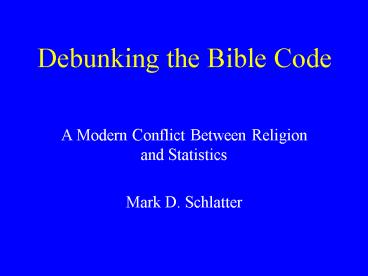Debunking the Bible Code - PowerPoint PPT Presentation
1 / 21
Title: Debunking the Bible Code
1
Debunking the Bible Code
- A Modern Conflict Between Religion and Statistics
- Mark D. Schlatter
2
Michael Drosnins The Bible Code
- Published in 1997 and quickly became a
best-seller - Based on the Great Rabbis experiment of
Witztum, Rips, and Rosenberg - Predicted the assasination of Israeli Prime
Minister Yitzhak Rabin using codes
3
Whats a skip code?
- Consider the following text
- Core classes can often provide a terrific segue
to a minor in some area which reawakens your love
of learning.
4
Whats a skip code?
- Remove the spaces, capitalization, and
punctuation - coreclassescanoftenprovideaterrificseguetoaminorin
someareawhichreawakensyourloveoflearning
5
Whats a skip code?
- Count off every nine letters, starting at the
first c - coreclassescanoftenprovideaterrificseguetoaminorin
someareawhichreawakensyourloveoflearning
6
Whats a skip code?
- Arrange the letters in rows of nine
- coreclass
- escanofte
- nprovidea
- terrifics
- eguetoami
- norinsome
- areawhich
- reawakens
- yourloveo
- flearning
7
Drosnins Rabin Prediction
The letters in Rabins name are 4772 characters
apart. The verse cited is Deuteronomy 442.
8
Drosnins Conclusions
- The odds against Rabins full name appearing
with the prediction of his assassination were at
least 3000 to 1. - The Bible Code may be a timed series of
revelations, each designed for the technology of
its age. - I am persuaded only that no human could have
encoded the Bible in this way.
9
Can you argue against this?
10
Can you argue against this?
- The odds of winning the jackpot are
80,089,127 to 1. - Were not surprised when someone wins because the
event connected to the probability (buying a
Powerball ticket) is repeated so many times.
11
When my critics find a message about the
assassination of a prime minister encrypted in
Moby Dick, I'll believe them.
Michael Drosnin, Newsweek, June 9, 1997
12
Herman Melville, Prognosticator
13
When trying to establish the truth of a
proposition using statistics, we must show that
the evidence supporting the proposition is
significantly different than what chance would
predict.
14
The Great Rabbis Experiment
- 1) Create a list of pairs of names and dates
corresponding to famous rabbis
15
The Great Rabbis Experiment
- 2) Create many lists where the pairs are mixed
Random List 1 rabbi1 date3 rabbi2 date1 rabbi3
date2 ...
Orginal List rabbi1 date1 rabbi2 date2 rabbi3
date3 ...
Random List 2 rabbi1 date7 rabbi2 date9 rabbi3
date22 ...
16
The Great Rabbis Experiment
- 3) Run a race by finding which list has the
greatest closeness number for the text. - If there are no skip codes in the text,
- we expect the original list to finish in the
middle of the pack. - If there are skip codes in the text,
- we expect the original list to beat most of the
other lists.
17
The Great Rabbis Experiment
- In the Book of Genesis, the original list came in
4th out of 1,000,000 lists, but in War and Peace
the list came in the middle of the pack. - We conclude that the proximity of ELSs with
related meanings in the Book of Genesis is not
due to chance. Statistical Science 1994, vol. 9,
no. 3.
18
How do you show an experiment is flawed?
- Look at the experimental design
- How were the rabbis chosen?
- How were their names and dates chosen?
- Is there room in the choosing process for bias
(intentional or not) to be introduced?
19
Was cheating possible?
- The team of McKay and Bar-Natan created a new
rabbis list following the original rules as
closely as the original team did. - They created a list which came in close to first
(57th out of 100 million) for War and Peace, but
in the middle of the pack for the Book of
Genesis.
20
Did the choices matter?
- The team of McKay, Bar-Natan, Bar-Hillel, and
Kalia analyzed many of the choices made by
Witztum, Rips, and Rosenberg in the Great Rabbis
Experiment. - Almost every choice made helped the original list
finish in a higher place.
21
Some web sites to look at
- cs.anu.edu.au/people/bdm/dilugim/torah.html Brend
an McKays site on Bible codes - www.torahcodes.co.il/ Doron Witztums site
on Bible codes - www.rsingermanson.com/ R. S. Ingermansons
site on Bible codes































